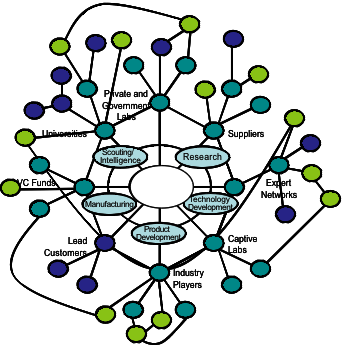How Do Expert Networks Handle Proprietary Or Sensitive Information?
When it comes to handling proprietary or sensitive information, expert networks play a crucial role. But have you ever wondered how they safeguard this valuable data? In this article, we’ll dive into the world of expert networks and explore how they handle proprietary or sensitive information.
Expert networks are like secret intelligence agencies, but instead of spies, they rely on a vast network of professionals. These networks connect clients with industry experts, allowing them to gain valuable insights and expertise. But with so much valuable information involved, how do these networks ensure it doesn’t fall into the wrong hands?
In this article, we’ll uncover the steps taken by expert networks to safeguard proprietary or sensitive information. So, if you’re curious about the inner workings of these networks and want to know how they keep their clients’ secrets safe, keep reading!
How Do Expert Networks Handle Proprietary or Sensitive Information?
Expert networks play a crucial role in connecting individuals or organizations seeking specialized knowledge with professionals possessing that expertise. However, one of the primary concerns when engaging with expert networks is how they handle proprietary or sensitive information. In this article, we will explore the measures and practices adopted by expert networks to ensure the confidentiality and security of such valuable information.
The Importance of Confidentiality in Expert Networks
In expert networks, confidentiality is paramount. Clients share proprietary information, trade secrets, and sensitive data, trusting that it will be kept private and secure. The reputation and success of expert networks depend on their ability to safeguard this valuable information. To achieve this, expert networks employ several measures to maintain confidentiality.
First and foremost, expert networks have strict protocols in place to ensure the integrity of their network members. They thoroughly vet and screen professionals before admitting them to the network. This includes background checks, verification of credentials, and assessment of their track record in handling sensitive information. By establishing a trusted community of experts, networks can mitigate the risk of information leaks.
Furthermore, expert networks invest heavily in secure technology infrastructure. They utilize encrypted communication channels, robust firewalls, and state-of-the-art data centers to protect client information. Access to sensitive data is restricted to authorized personnel only, and comprehensive security protocols are implemented to prevent unauthorized breaches. Regular audits and testing ensure that all security measures are up to date and effective.
Finally, expert networks emphasize the importance of confidentiality through strict codes of conduct and non-disclosure agreements (NDAs). These agreements legally bind network members to maintain confidentiality and prohibit the sharing of proprietary information with outside parties. Violations of these agreements can result in severe consequences, including legal action and termination from the network. By setting clear expectations and enforcing strict confidentiality policies, expert networks instill a culture of trust and accountability.
Strategies for Ensuring Confidentiality in Expert Networks
To further strengthen confidentiality protocols, expert networks employ various strategies and best practices. These strategies serve as additional layers of protection, minimizing the risk of data breaches or unauthorized disclosures.
One common practice is the compartmentalization of information. Expert networks ensure that members only have access to relevant and necessary data required for their engagements. This limits the exposure of sensitive information and reduces the likelihood of accidental leaks. Additionally, networks implement data anonymization techniques to further protect the identities of clients and maintain confidentiality.
Another important strategy is continuous training and education. Expert networks regularly conduct workshops and training sessions to educate their members on the importance of confidentiality and to provide updates on best practices for handling sensitive information. These sessions cover topics such as secure communication methods, secure document sharing platforms, and data privacy regulations. By keeping their members informed and up to date, expert networks empower them to make informed decisions and maintain confidentiality at all times.
Additionally, expert networks employ dedicated internal teams responsible for overseeing security and compliance. These teams are trained in risk management and are equipped to handle any potential breaches or security incidents. They collaborate with external cybersecurity experts to stay ahead of emerging threats and constantly update security measures accordingly.
The Benefits of Engaging with Expert Networks for Proprietary or Sensitive Information
Engaging with expert networks for proprietary or sensitive information offers several benefits to clients.
Firstly, clients can tap into a vast pool of specialized knowledge and experience that may not be readily available within their organization. This access to external expertise can drive innovation, problem-solving, and informed decision-making.
Furthermore, expert networks provide a secure and efficient channel for accessing this valuable knowledge. Rather than investing time and resources in recruiting and onboarding internal experts, clients can quickly connect with the right professionals through expert network platforms. This saves time and ensures the confidentiality of sensitive information.
Lastly, engaging with expert networks offers flexibility and scalability. Clients can access experts on a project-by-project basis, allowing them to adapt to changing needs and requirements. This agility promotes cost-effectiveness and minimizes long-term commitments.
In conclusion, expert networks prioritize the confidentiality and security of proprietary and sensitive information. Through thorough vetting, robust technology infrastructure, and strict confidentiality protocols, these networks ensure that client data remains protected. Clients benefit from the expertise, efficiency, and flexibility offered by expert networks, making them a valuable resource for handling proprietary or sensitive information.
Key Takeaways: How do expert networks handle proprietary or sensitive information?
- Expert networks have strict policies and procedures in place to safeguard proprietary and sensitive information.
- They use secure communication channels and encrypted platforms to protect data.
- Experts are thoroughly vetted and required to sign confidentiality agreements.
- Data access is limited to authorized personnel on a need-to-know basis.
- Regular audits and monitoring ensure compliance with data protection regulations.
Frequently Asked Questions
Welcome to our FAQ section! Here, we address commonly asked questions regarding how expert networks handle proprietary or sensitive information. Learn more about the policies and practices that ensure the confidentiality and security of your data.
1. How do expert networks protect proprietary information?
Expert networks prioritize the protection of proprietary information through strict security measures. They use advanced encryption protocols to safeguard data during transmission and storage. Additionally, these networks have robust access controls in place to limit who can view and handle sensitive information.
Furthermore, expert networks require their employees and experts to sign non-disclosure agreements (NDAs), ensuring that confidential information is kept strictly confidential. All these measures collectively ensure that proprietary information remains secure and only accessed by authorized individuals who are bound by legal obligations to maintain confidentiality.
2. What steps do expert networks take to ensure data privacy?
Data privacy is a top priority for expert networks. They implement a range of measures to protect the privacy of their users. This includes anonymizing and de-identifying data, removing any personally identifiable information (PII) from reports or analysis.
Additionally, expert networks comply with applicable data protection laws and regulations, such as the General Data Protection Regulation (GDPR) in the European Union. They have strict policies and procedures in place to handle personal data securely, giving users the assurance that their privacy is respected and their information is handled appropriately.
3. How are conflicts of interest addressed by expert networks?
Expert networks take conflicts of interest very seriously and have established procedures to mitigate them. They carefully screen experts to ensure that they don’t have any conflicts that could compromise the integrity of the information they provide.
When engaging with clients, expert networks have robust policies in place to manage potential conflicts of interest. This includes implementing internal measures to identify and address any conflicts that may arise during the consultation process. By proactively addressing conflicts of interest, expert networks maintain the trust and integrity of their services.
4. Can clients trust the confidentiality of their conversations with experts?
Absolutely. Expert networks understand that confidentiality is paramount to maintain trust between clients and experts. They have strict policies in place to ensure that all conversations and interactions between clients and experts remain strictly confidential.
These policies include the use of secure communication channels, encryption of sensitive information, and the enforcement of NDAs. Expert networks work diligently to uphold the privacy and confidentiality of all client-expert interactions, allowing clients to have open and candid discussions while ensuring their information is protected.
5. What happens if a breach of confidentiality occurs?
In the unlikely event of a breach of confidentiality, expert networks have incident response protocols in place to swiftly address the situation. They promptly investigate the breach, assess the impact, and take corrective actions to prevent further breaches.
Expert networks work closely with cybersecurity experts to continually enhance their security measures and ensure that their systems are adequately protected. They prioritize transparency and will communicate with affected parties to provide guidance and support in the event of a breach, meeting their commitment to maintaining the highest standards of confidentiality and security.
Summary
Expert networks are companies that help connect professionals with industry experts for advice and insights. These networks value keeping information confidential and have measures in place to protect sensitive information. They use non-disclosure agreements and strict vetting processes to ensure experts maintain confidentiality. Additionally, expert networks have secure platforms and protocols to safeguard data and prevent unauthorized access. Trust and privacy are of utmost importance in expert networks, and they strive to maintain the highest standards to protect proprietary and sensitive information.
Overall, expert networks are committed to maintaining confidentiality and protecting sensitive information. They prioritize trust, privacy, and security in their operations to ensure that experts and clients can confidently share and access valuable insights without the risk of breaches or leaks. By following stringent protocols and utilizing secure systems, expert networks offer a reliable avenue for professionals to tap into the knowledge and expertise of industry experts while upholding the importance of confidentiality.


